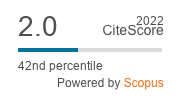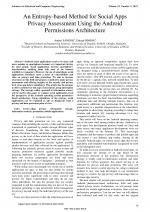| 3/2022 - 9 |
An Entropy-based Method for Social Apps Privacy Assessment Using the Android Permissions ArchitectureSANDOR, A. |
| View the paper record and citations in |
| Click to see author's profile in |
| Download PDF |
Author keywords
data privacy, information entropy, information security, permission, mobile applications
References keywords
android(24), privacy(19), security(15), mobile(13), access(11), applications(10), analysis(8), malware(6), apps(6), software(5)
Blue keywords are present in both the references section and the paper title.
About this article
Date of Publication: 2022-08-31
Volume 22, Issue 3, Year 2022, On page(s): 79 - 86
ISSN: 1582-7445, e-ISSN: 1844-7600
Digital Object Identifier: 10.4316/AECE.2022.03009
Web of Science Accession Number: 000861021000009
SCOPUS ID: 85137687061
Abstract
Android social applications tend to be more and more popular as smartphones became very important devices for most people. Social applications increase smartphones functionalities, enabling them with most of the features available on computers. However, the use of smartphone social applications introduces users a series of vulnerabilities and risks on privacy and data protection. We aim to increase awareness on this field and propose a method to make privacy assessments and offering insights on the security and privacy level of an app before installing it. This article has the purpose to offer a solution for this type of assessment, using information entropy. The concept, widely operated in information science, will be used in this paper to evaluate social applications from the perspective of the Android operating system permission-based architecture. Using calculations of the entropy, social applications can be evaluated as safe or dangerous from a privacy and data protection point of view. |
| References | | | Cited By |
Web of Science® Times Cited: 0
View record in Web of Science® [View]
View Related Records® [View]
Updated 2 days, 22 hours ago
SCOPUS® Times Cited: 0
View record in SCOPUS® [Free preview]
There are no citing papers in the CrossRef Cited-by Linking system.
Disclaimer: All information displayed above was retrieved by using remote connections to respective databases. For the best user experience, we update all data by using background processes, and use caches in order to reduce the load on the servers we retrieve the information from. As we have no control on the availability of the database servers and sometimes the Internet connectivity may be affected, we do not guarantee the information is correct or complete. For the most accurate data, please always consult the database sites directly. Some external links require authentication or an institutional subscription.
Web of Science® is a registered trademark of Clarivate Analytics, Scopus® is a registered trademark of Elsevier B.V., other product names, company names, brand names, trademarks and logos are the property of their respective owners.
Faculty of Electrical Engineering and Computer Science
Stefan cel Mare University of Suceava, Romania
All rights reserved: Advances in Electrical and Computer Engineering is a registered trademark of the Stefan cel Mare University of Suceava. No part of this publication may be reproduced, stored in a retrieval system, photocopied, recorded or archived, without the written permission from the Editor. When authors submit their papers for publication, they agree that the copyright for their article be transferred to the Faculty of Electrical Engineering and Computer Science, Stefan cel Mare University of Suceava, Romania, if and only if the articles are accepted for publication. The copyright covers the exclusive rights to reproduce and distribute the article, including reprints and translations.
Permission for other use: The copyright owner's consent does not extend to copying for general distribution, for promotion, for creating new works, or for resale. Specific written permission must be obtained from the Editor for such copying. Direct linking to files hosted on this website is strictly prohibited.
Disclaimer: Whilst every effort is made by the publishers and editorial board to see that no inaccurate or misleading data, opinions or statements appear in this journal, they wish to make it clear that all information and opinions formulated in the articles, as well as linguistic accuracy, are the sole responsibility of the author.





